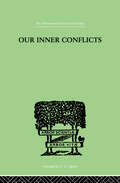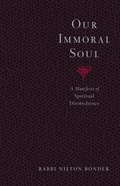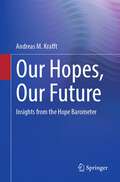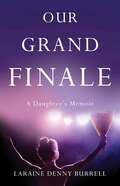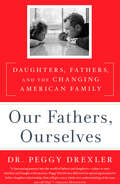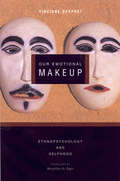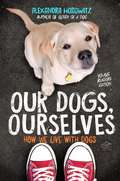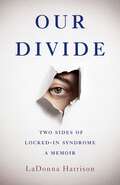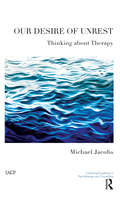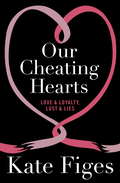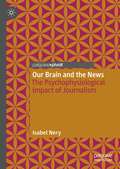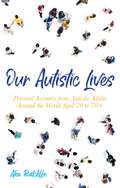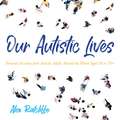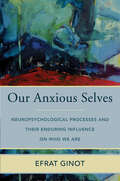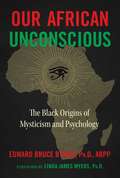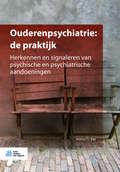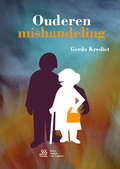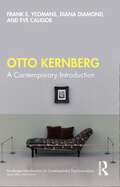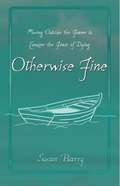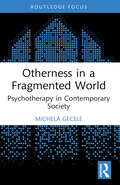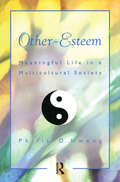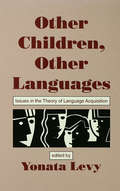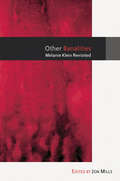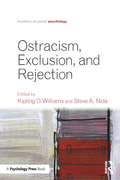- Table View
- List View
Our Inner Conflicts: A CONSTRUCTIVE THEORY OF NEUROSIS (International Library Of Psychology Ser.)
by Horney, KarenFirst Published in 1999. Routledge is an imprint of Taylor & Francis, an informa company.
Our Immoral Soul: A Manifesto of Spiritual Disobedience
by Nilton BonderRabbi Bonder turns a few conventional ideas on their heads as he identifies the forces at play in individual, social, and spiritual transformation. Many people believe that obedience to the established moral order leads to the well-being of society as well as the salvation of their souls. On the contrary, says Bonder, the human spirit is nourished by the impulse to betray and transgress the ways of the past. Even the Bible legitimizes our God-given urge to disobey in order to evolve, grow, and transcend. It is this "immoral" soul of ours that impels us to do battle with God—and out of this clash, Bonder predicts, a new humanity will emerge. In the course of discussion, he examines a variety of intriguing issues touching on religion, science, and culture, including the findings of evolutionary psychology; the relation of body and soul; infidelity in marriage; the stereotype of Jew as traitor; sacrifice and redemption in Judaism and Christianity; and the Messiah as archetypal transgressor.
Our Hopes, Our Future: Insights from the Hope Barometer
by Andreas M. KrafftHow can we overcome crises and shape our common future?Since the beginning of the Corona pandemic, we have all been put to an immense test. This shows how humanity can successfully and constructively deal with such situations and make the best of them. And we learn that the future is not something that happens to us, but that we can actively and constructively shape it. The basic prerequisite for this is an attitude of openness, mutual helpfulness and hope. This non-fiction book vividly reports on the currently prevailing images of the future and the common longings as well as on people's capacity for hope and action. It reveals the power of desirable images of the future and of a collective hope as the opposite of general helplessness or of blind and naïve optimism. The central statements of this book are based on the experiences of thousands of people in more than ten countries who participated in the scientific study of the Hope Barometer in 2019 and 2020. In a unique way, this combines lived practice with the latest findings of social science futurology, positive psychology and pragmatic philosophy. Target groups:This book is for anyone who wants to look to the future with hope. It offers concrete answers to key questions and shows how crises can be overcome while shaping a better future for individuals and society as a whole. About the author:Dr. Andreas M. Krafft teaches at the University of St. Gallen and at the Free University of Berlin. As co-president of swissfuture, the Swiss Association for Futures Research, and as a board member of the Swiss Society for Positive Psychology, he leads the international research network of the Hope Barometer.
Our Grand Finale: A Daughter's Memoir
by Laraine Denny BurrellLaraine Burrell gets the call to come back to England from the United States just in time to visit briefly with her father before he passes away. Following his death, she is overcome with grief, feeling that she has squandered the time she had with her father. Instead of staying close, she chose to travel the world and seek her own goals as a young woman, always thinking there would be time later on to tell her dad all the things she wanted to tell him—how much she loved him, and how he was her hero. Now, she realizes, it&’s too late. Wanting to do something significant for her father to make up for her neglect, Burrell reflects on the fascinating life her father, a Royal Yachtsman, led—and decides that the one thing she can do for him is to tell his exceptional life story and make sure he is not forgotten. Our Grand Finale is the culmination of that effort—an exploration of both the author&’s and her father&’s unusual life experiences, and a reminder that &“later&” doesn&’t always come.
Our Fathers, Ourselves: Daughters, Fathers, and the Changing American Family
by Peggy DrexlerThere's no denying that a woman's relationship with her father is one of the most important in her life. And there's also no getting around how the quality of that relationship—good, bad, or otherwise—profoundly affects daughters in a multitude of ways.In Our Fathers, Ourselves, research psychologist, author and scholar Dr. Peggy Drexler examines the ways in which the father-daughter bond impacts women and offers helpful advice for creating a better, stronger, more rewarding relationship. Through her extensive research and interviews with women, Dr. Drexler paints an intimate, timely portrait of the modern father-daughter relationship.Women today are increasingly looking to their dads for a less-than-traditional bond, but one that still stands the test of time and provides support, respect, and guidance for the lives they lead today. Our Fathers, Ourselves is essential reading for any woman who has ever wondered how she could forge a closer connection with and gain a deeper understanding of her father.
Our Emotional Makeup
by Vinciane DespretBroken hearts, edgy nerves, tightened throats—our emotions grab and take hold of us. But if our emotions appear obvious to us, are they necessarily real or universal? This, of course, is what researchers in physiology and psychology assert, but they will ultimately be disappointed. Vinciane Despret sets out in this book to show how some of our emotions, precisely those we thought were a natural part of our make-up, do not exist unless they have been inscribed in our subjectivity through the mediation of culture. Emotions do not exist per se, but only within relations to others. Anthropologists and ethnologists often return from distant regions and remote islands with emotions unknown to their peers at home, and which can only be expressed in the tribal tongue they have learned. Following such discoveries, one should not be surprised to find that anger does not exist among the Uktus, and the Ikfalus have to teach fear to their children. One only has to consider the emotions of other cultures and traditions to recognize that they are human productions with wide and significant variations, like good manners. Our emotions, finally, represent the way that we see the world and try to make it our own.
Our Dogs, Ourselves -- Young Readers Edition: How We Live with Dogs
by Alexandra HorowitzThis middle grade adaptation of Our Dogs, Ourselves is an eye-opening, entertaining, and beautifully illustrated look about humans&’ complicated and sometimes contradictory relationship with man&’s best friend by New York Times bestselling author of Inside of a Dog—Young Readers Edition.We keep dogs and are kept by them. We love dogs and (we assume) we are loved by them. Even while we see ourselves in dogs, we also treat them in surprising ways. On the one hand, we let them into our beds, we give them meaningful names, make them members of our family, and buy them the best food, toys, accessories, clothes, and more. But we also shape our dogs into something they aren&’t meant to be. Purebreeding dogs has led to many unhealthy pups. Many dogs have no homes, or live out their life in shelters. How is it possible we can treat the same species in these two totally different ways? In Our Dogs, Ourselves Young Readers Edition, bestselling author of Inside of a Dog, Alexandra Horowitz reveals the odd, surprising, and contradictory ways we live with dogs.
Our Divide: Two Sides of Locked-In Syndrome
by LaDonna HarrisonOur Divide: Two Sides of Locked in Syndrome is the story of the other side—the side of the young, pregnant wife of a man who, at age twenty-seven, is struck down by an obstruction in the brain stem, leaving him with a rare neurological disorder called locked-in syndrome. Like Jean-Dominique Bauby of The Diving Bell and the Butterfly, Cleve is rendered mute and paralyzed by the syndrome—but unlike Bauby, he is unable to move at all, unable to sit up in a wheelchair or communicate by blinking an eye.Our Divide is a beautifully written, honest account of the experience of watching a loved one suffer. Harrison delivers both a peek into the world of a unique other and an intimate view of one young woman&’s grieving process. A heartbreaking story that&’s at once a grief, a coming-of-age, and a survival narrative, this genuine, honest portrayal of one woman&’s mistakes and courage while learning how to take responsibility and create a life for herself will sweep readers away.
Our Desire of Unrest: Thinking About Therapy (The\united Kingdom Council For Psychotherapy Ser.)
by Michael JacobsKnowledge is never static. It is always open to revolutionary thinking or to evolving development. Similarly an individual's knowledge is always moving, and indeed if the ability to think about ideas is lost, an important part of the individual is also lost. In this book, a collection of some of the papers and lectures written by Michael Jacobs over a period of thirty or more years, the author shows his own thinking at work, as he challenges himself to look deeper at some important aspects of his discipline - principally psychodynamic psychotherapy, although always with reference to other forms of discourse such as literature and theology. Here the reader will find the writer behind those popular texts such as The Presenting Past, Psychodynamic Counselling in Action, and Shakespeare on the Couch.
Our Cheating Hearts: Love and Loyalty, Lust and Lies
by Kate FigesBy the author known and respected for her acclaimed books on relationships.Most of us manage to be monogamous, most of the time, but who cannot imagine themselves committing the 'crime' of adultery? Does being 'faithful' mean the same to everyone? Why DO people have affairs?Using real life testimony alongside the most current research, Our Cheating Hearts looks at the big questions around love and commitment. It lifts taboos, asks the tough questions and shows how in our progressive time monogamy has become the new ideal.Some people manage monogamy. For the countless others that don't, Our Cheating Hearts opens the debate and provides the honest approach that's essential.
Our Cheating Hearts: Love and Loyalty, Lust and Lies
by Kate FigesBy the author known and respected for her acclaimed books on relationships.Most of us manage to be monogamous, most of the time, but who cannot imagine themselves committing the 'crime' of adultery? Does being 'faithful' mean the same to everyone? Why DO people have affairs?Using real life testimony alongside the most current research, Our Cheating Hearts looks at the big questions around love and commitment. It lifts taboos, asks the tough questions and shows how in our progressive time monogamy has become the new ideal.Some people manage monogamy. For the countless others that don't, Our Cheating Hearts opens the debate and provides the honest approach that's essential.
Our Brain and the News: The Psychophysiological Impact of Journalism
by Isabel NeryThis book explores the impact of news and literary journalism on human cognition and emotion. Providing an innovative analysis of psycho-physiological measures, including emotional response, perception of pain, and changes in heartbeat, Nery seeks to understand how readers react to journalistic texts. There is a growing enthusiasm in the search for understanding the processing of information, with some already arguing for the establishment of the neuroscience of communication as a new discipline. By combing neuroscience methods with communication research studies, specifically journalistic research and theory, Nery offers us a unique way of exploring and thinking about news, literary journalism, and the brain.
Our Autistic Lives: Personal Accounts from Autistic Adults Around the World Aged 20 to 70+
by Edited by Alex RatcliffeThis collection of narratives from autistic adults is structured around their decades of experience of life, covering 20s, 30s, 40s, 50s, 60 and 70s+. These are varied and diverse, spanning different continents, genders, sexualities and ethnicities, yet the author highlights the common themes that unite them and skilfully draws out these threads. Each chapter is based on accounts from one age group and includes accounts from people of that age, giving an insight into the history of autism and signifying how gaining a diagnosis (or not) has changed people's lives over time. The book is about ageing with an autistic mind, and helping the reader find connections between neurotypical and neurodiverse people by acknowledging the challenges we all face in our past, present and futures.
Our Autistic Lives: Personal Accounts from Autistic Adults Around the World Aged 20 to 70+
This collection of narratives from autistic adults is structured around their decades of experience of life, covering 20s, 30s, 40s, 50s, 60 and 70s+. These are varied and diverse, spanning different continents, genders, sexualities and ethnicities, yet the author highlights the common themes that unite them and skilfully draws out these threads. Each chapter is based on accounts from one age group and includes accounts from people of that age, giving an insight into the history of autism and signifying how gaining a diagnosis (or not) has changed people's lives over time. The book is about ageing with an autistic mind, and helping the reader find connections between neurotypical and neurodiverse people by acknowledging the challenges we all face in our past, present and futures.(P) 2020 Hodder & Stoughton Ltd
Our Anxious Selves: Neuropsychological Processes and their Enduring Influence on Who We Are (Norton Series on Interpersonal Neurobiology #0)
by Efrat GinotDiscussing the outsized role that fear, anxiety, and other distressing emotions play in forming fundamental aspects of who we are. Using recent findings from neuropsychology, this new book in the best-selling Norton Series on Interpersonal Neurobiology shows that who we are psychologically starts with the early presence of an easily aroused fear/anxiety system. It goes on to discuss how clinicians can view people’s difficulties with self-confidence and identity, and how self-destructive patterns can be traced back to these systems and what clinicians can do to help. It also touches on intergenerational transmission of trauma, as well as people’s responses to COVID-19, PTSD, and real and imagined threats.
Our African Unconscious: The Black Origins of Mysticism and Psychology
by Edward Bruce Bynum• Examines the Oldawan, the Ancient Soul of Africa, and its correlation with what modern psychologists have defined as the collective unconscious • Draws on archaeology, DNA research, history, and depth psychology to reveal how the biological and spiritual roots of religion and science came out of Africa • Explores the reflections of our African unconscious in the present confrontation in the Americas, in the work of the Founding Fathers, and in modern psychospirituality The fossil record confirms that humanity originated in Africa. Yet somehow we have overlooked that Africa is also at the root of all that makes us human--our spirituality, civilization, arts, sciences, philosophy, and our conscious and unconscious minds. In this extensive look at the unfolding of human history and culture, Edward Bruce Bynum reveals how our collective unconscious is African. Drawing on archaeology, DNA research, depth psychology, and the biological and spiritual roots of religion and science, he demonstrates how all modern human beings, regardless of ethnic or racial categorizations, share a common deeper identity, both psychically and genetically--a primordial African unconscious. Exploring the beginning of early religions and mysticism in Africa, the author looks at the Egyptian Nubian role in the rise of civilization, the emergence of Kemetic Egypt, and the Oldawan, the Ancient Soul, and its correlation with what modern psychologists have defined as the collective unconscious. Revealing the spiritual and psychological ramifications of our shared African ancestry, the author examines its reflections in the present confrontation in the Americas, in the work of the Founding Fathers, and in modern Black spirituality, which arose from African diaspora religion and philosophy. By recognizing our shared African unconscious--the matrix that forms the deepest luminous core of human identity--we learn that the differences between one person and another are merely superficial and ultimately there is no real separation between the material and the spiritual.
Ouderenpsychiatrie: Herkennen en signaleren van psychische en psychiatrische aandoeningen
by Martin G. KatDit boek leert zorgprofessionals die werken met ouderen, om psychiatrische en psychische aandoeningen bij hun cliënten te herkennen en signaleren. Zij kunnen dankzij dit boek vroege adequate behandeling mogelijk maken.Dit boek koppelt praktijkvoorbeelden aan de beschreven aandoeningen bij ouderen. Professionals die werken met ouderen, zoals verzorgenden, (wijk)verpleegkundigen, POH’s en casemanagers.
Ouderenmishandeling
by Gerda KredietHet boek ‘Ouderenmishandeling’ is bedoeld voor professionals in de zorg die in hun werk te maken krijgen met ouderen die mishandeld worden. Ouderenmishandeling is vaak een gevolg van overbelaste mantelzorg, echtelijke ruzies en opzettelijke mishandeling. De mishandeling kan bestaan uit lichamelijke mishandeling, psychische mishandeling, verwaarlozing, financiële uitbuiting en seksuele mishandeling. Het boek bestaat uit twee delen. In het eerste deel zijn vijftien casussen beschreven, waarna een analyse volgt van de gepleegde interventies en de resultaten. De casuïstiek is toegankelijk beschreven en maakt goed duidelijk wat ouderenmishandeling precies is, ook voor de nonprofessional. In het tweede deel worden interventiemogelijkheden beschreven die professionele hulpverleners concreet kunnen helpen bij de aanpak van ouderenmishandeling. Daarnaast vindt de lezer belangrijke informatie over wet- en regelgeving. ‘Ouderenmishandeling’ is een onmisbaar boek voor iedereen die zich beroepsmatig bezighoudt met ouderen: aandachtfunctionarissen, medewerkers Steunpunten Huiselijk Geweld, artsen, psychiaters, verpleegkundigen, thuiszorgmedewerkers, ouderenadviseurs en maatschappelijk werkers. Gerda Krediet werkte tien jaar als sociaalpsychiatrisch verpleegkundige bij het Meldpunt Ouderenmishandeling van de GGD Rotterdam-Rijnmond. Zij is nu directeur van Nood Zaak, een bureau voor advies, onderzoek en interventie bij ouderenmishandeling, en professioneel mentorschap.
Otto Kernberg: A contemporary Introduction (Routledge Introductions to Contemporary Psychoanalysis)
by Diana Diamond Eve Caligor Frank E. YeomansIn this book, Frank E. Yeomans, Diana Diamond, and Eve Caligor provide a systemic review of Otto Kernberg’s multiple contributions to psychoanalysis, psychiatry, psychology, and our understanding of the mind and group behavior.The book spans the full scope of Kernberg’s career, both highlighting the diversity of topics on which his writings have shed light and emphasizing conceptual threads that link the different areas of his work. It accessibly follows the experiences that had an impact on the development of his thought and the increasingly strong impact his writing and thinking have had on psychoanalysis and related fields. The authors draw on their decades of working closely with Kernberg to offer a unique insight into his teaching and research, focusing on his work on borderline and narcissistic pathology and the fundamental conceptualization of personality disorders.Including an overview of Kernberg’s critique and expansion of traditional psychoanalytic training, as well as his role in developing transference-focused psychotherapy, this book is an invaluable guide to students, researchers, and analysts in practice and training looking to integrate Kernberg’s ideas into their own clinical and theoretical work.
Otherwise Fine: Moving Outside the Frame to Conquer the Fears of Dying
by Susan BarryThe "worm at the core" is what William James called the fear of dying in each of us. Otherwise Fine treats the myriad forms of this fear, particularly those heightened in our prime middle years of good health. These can be more acute in Late-or-Never-Bloomers, those who suffer the "Blew-It Anxiety" of unmet potentials or the misfortune of circumstances, inauthentic or diffused identities; as well as those with skeptical or quasi-afterlife beliefs. Also offered are four guideposts for weathering the dying stage itself, and a look beyond it.
Otherness in a Fragmented World: Psychotherapy in Contemporary Society (Field Perspectives and Clinical Practice)
by Michela GeceleThis book explores a key theme both for humanity and for psychotherapy—how we can understand ourselves as a web of relational connections within the wider world that shapes us all.Grounds are the often invisible scenery of our life. They are all that concern us as human beings—the sum total of relationships, events, all that happens and has happened, our conquests, and our connections together with what is unfinished and what has yet to emerge. Moving within a horizon of phenomenology and Gestalt therapy, the author explores how we are continuously built and kept alive through our unceasing engagement with otherness—whether cultural, social, linguistic, gender or otherwise, and so how humanity is intrinsically made by otherness, novelty, and challenging experiences that transform us in a way we can never anticipate. At the same time, we also define ourselves by identifying with certain groups which become part of who we see ourselves as being. Her aim is to describe and connect the forms of suffering and the creative adjustments found today with the grounds from which they emerge, rather than with the figures that stand out more visibly and can blind us.Drawing on extensive clinical practice and a deep understanding of Gestalt Therapy, this is essential reading for all psychotherapists and anyone seeking to understanding how we exist as human beings and as part of a plurality of affiliations and non-affiliations.
Other Esteem: Meaningful Life in a Multicultural Society (Accelerated Development Ser.)
by Philip O. HwangFirst published in 2000. Routledge is an imprint of Taylor & Francis, an informa company.
Other Children, Other Languages: Issues in the theory of Language Acquisition
by Yonata LevyThis volume investigates the implications of the study of populations other than educated, middle-class, normal children and languages other than English on a universal theory of language acquisition. Because the authors represent different theoretical orientations, their contributions permit the reader to appreciate the full spectrum of language acquisition research. Emphasis is placed on the principle ways in which data from pathology and from a variety of languages may affect universal statements. The contributors confront some of the major theoretical issues in acquisition.
Other Banalities: Melanie Klein Revisited
by Jon MillsMelanie Klein is one of the few analysts whose body of work has inspired sociologists, philosophers, religious scholars, literary critics and political theorists, all attracted to the cross-fertilisation of her ideas. Other Banalities represents a long over-due exploration of her legacy, including contributions from acclaimed interdisciplinary scholars and practitioners. The contributors situate Klein within the history of the psychoanalytic movement, investigate her key theoretical and clinical advances, and look at how her thought has informed contemporary perspectives in the behavioural sciences and humanities. Topics covered range from Klein’s major psychological theories to clinical pathology, child development, philosophy, sociology, politics, religion, ethics and aesthetics. This volume reflects the auspicious future for Kleinian revivalism and demonstrates the broad relevance of Kleinian thought. It will be of great interest to scholars and practitioners of psychology, psychoanalysis and psychotherapy.
Ostracism, Exclusion, and Rejection: Ostracism, Social Exclusion, Rejection, And Bullying (Frontiers of Social Psychology #Vol. 7)
by Kipling D. Williams Steve A. NidaOstracism, Exclusion, and Rejection examines research into the related phenomena of ostracism, exclusion and rejection. Most individuals have experienced both sides of the coin: being ostracized and ostracizing others. People experience mild forms of ostracism on a daily basis, but some endure years and decades of being the social outcast. How does it feel to be shunned, left out, not wanted? Research suggests that even the mildest and briefest forms of ostracism are painful and have downstream consequences to our feelings of social connection. Longer-term ostracism has devastating consequences on individuals’ health and well-being. This innovative compilation covers how being cast out affects the brain and body chemistry, feelings and emotions, thoughts and beliefs, and behaviors. In addition to the primary focus on targets of ostracism, researchers also examine the motives and consequences of ostracizing. Social scientists from social psychology, developmental psychology, neuroscience, communication science, cross-cultural psychology, and anthropology tackle these questions with cutting-edge methods and provocative theories. A key volume for all in those fields, this book also presents applications from the schoolyard to the workplace, and sounds a much-needed call for further research on this universal behavior of all social animals.
